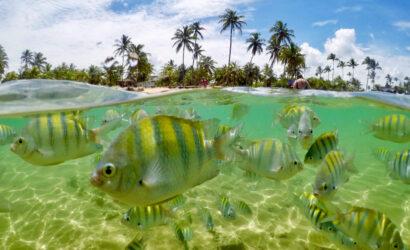Discover
Salvador
Talking a little about
Salvador, the capital of the state of Bahia in northeastern Brazil, is renowned for its Portuguese colonial architecture, Afro-Brazilian culture, and tropical coastline. The Pelourinho neighborhood is its historical heart, featuring cobblestone alleys leading to spacious squares, colorful buildings, and baroque churches such as São Francisco, adorned with wooden works coated in gold.
Region
Northeast
Population
2 million inhabitants
Climate
Tropical, semi-arid
Main attractions
Beaches and street carnival

Some
Curiosities
Salvador, the capital of the state, is one of the oldest cities in the country, founded in 1549; and it was the colonial capital until the 18th century, being the first capital of Brazil, due to its location in an area with significant Brazilwood extraction.
The main musical genre remembered when talking about Bahia is axé, but it goes far beyond that. This is because it is an expression originating in Candomblé, linked to the sacred power of the orixás, and is widely used to discuss contexts of strength and power.
One of the main traditional dishes there is a spicy fried bean cake known as “acarajé,” which is prepared by the “baianas” (local women) who often sell them on the streets there. In addition to the over 5,000 “baianas” found on the streets of Salvador, there is also the Day of the Acarajé Vendor, which celebrates this significant figure on November 25th.
Although the Vale dos Vinhedos, in Rio Grande do Sul, is well-known for being the largest wine producer in the country, the Rio São Francisco region has vast vineyards that lead to the production of high-quality grapes and excellent wines.
Although Catholicism is the predominant religion in Brazil, Afro-Brazilian religions such as Candomblé and Umbanda are also part of the spectrum of religions in the country; and the majority of their followers are from Bahia.
If there’s one thing that Bahia excels at, it’s the stunning beaches, both in the capital, Salvador, and in the inland cities. And it’s not without reason! There are about 1000 km of coastline!






